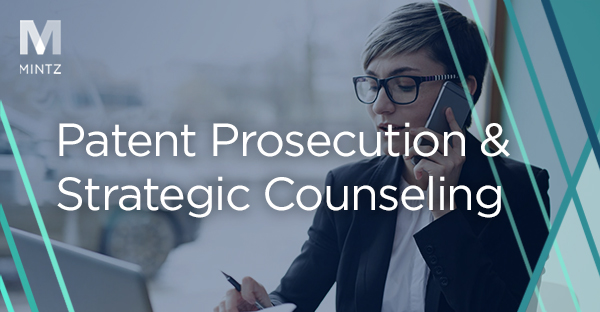
Patent Prosecution & Strategic Counseling
Viewpoints
Filter by:
The New Rubric for Obviousness-Type Double Patenting
October 21, 2024 | | By Alex Trimble, PhD
Disqualifying an Inventor’s Prior Publication as Prior Art – Invoking §102(b)(1)(A)
July 6, 2023 | Blog | By James Whittle, PhD, Dean Farmer, PhD
An invention is not patentable if it was described in, or obvious in view of, an earlier printed publication. See 35 U.S.C. 102(a)(1). This blog post addresses how to overcome an anticipation or obviousness rejection where an inventor is the author or otherwise the source of subject matter in the publication cited as prior art
Mintz EnergyTech Update: New Hydrogen Patents Data Released
March 9, 2023 | Blog | By Brad M Scheller
The European Patent Office (EPO) and International Energy Agency (IEA) have now released “Hydrogen Patents for a Clean Energy Future” – a comprehensive report on innovation in clean-energy hydrogen technologies over the past two decades according to global patent filings. Patents remain strong indicators of innovation activity and the state and direction of science. The report provides a unique look at where green hydrogen investment has been focused and where it are heading based on international patent families (“IPFs”). According to the report, IPFs are reliable proxies for inventive activity as each represents an invention having value sufficient for seeking protection across multiple patent offices.
Avoiding Pitfalls: IP “Dos and Don’ts” for High-Tech Start Ups
February 27, 2023 | Blog | By Daniel Weinger, Frank Gerratana, Greg Penoyer
Starting a high-tech company is a difficult, exhausting, and thrilling endeavor – one in which founders will face seemingly endless challenges, deadlines, and make or break decisions. From a venture’s inception, founders face numerous decisions that if not thoughtfully considered can result in significant legal and financial risk.
Year in Review: The Most Popular IP Posts of 2022
January 5, 2023 | Blog | By Christina Sperry
Innovators developing IP strategies for 2023 are reflecting on last year’s key IP issues, including entity size designations for US patent applications, erasures of patent damage awards due to flawed expert opinions, and developments involving the ITC, artificial intelligence and machine learning, and inter partes reviews.
Determining Entity Status Before the United States and Patent Trademark Office: Large, Small, or Micro?
May 3, 2022 | Blog | By Christina Sperry, Elissa Kingsland
At the time of filing any patent application with the United States and Patent Trademark Office (USPTO), patent applicants must designate their entity status. Selecting the correct entity status can significantly reduce costs, so it is important to determine the correct entity status and update the status as needed throughout a patent’s and patent application’s life. There are three types of entity statuses: large, small, or micro, with small and micro entities being entitled to reduced USPTO fees
Your Patent Application Is About To Get A First Office Action: Now What?
February 9, 2022 | Blog | By Christina Sperry
USPTO’s New Deferred Subject Matter Eligibility Response Pilot Program
January 21, 2022 | Blog | By Brad M Scheller , Meena Seralathan
Year in Review: The Most Popular IP Posts of 2021
January 5, 2022 | Blog | By Christina Sperry
PATENT 101: Key Considerations and Activities for Establishing a Patent Program (Part 2 of 3)
December 1, 2021 | Blog | By Michael Van Loy, Kevin Amendt, Nicholas Eadie
Examining Art Units to Avoid Subject Matter Eligibility Challenges for Bioinformatics and AI-related Patents
November 18, 2021 | Blog | By Terri Shieh-Newton, Mark Hammond
The Patentability of Blockchain and Cryptocurrency
November 5, 2021 | Video | By Frank Gerratana
Genus Claims: Foiled again by Written Description
September 16, 2021 | Blog | By Thomas Wintner
The USPTO’s Patent Classification and Search Systems Have Jumped on the AI Bandwagon
July 8, 2021 | Blog | By Christina Sperry, Amanda Metell
PATENT 101: Key Considerations and Activities for Establishing a Patent Program (Part 1 of 3)
July 7, 2021 | Blog | By Michael Van Loy, Kevin Amendt, Nicholas Eadie
Reduced Scope of March-in Rights Under Bayh Dole Rules Revisions
June 16, 2021 | Blog | By Marc Morley
Failing to Adequately Support a Means-Plus-Function Claim Term Renders a Claim Invalid
June 3, 2021 | Blog | By Pedro Suarez, Joshua Berk
How NFTs and Blockchain Secure Digital Sports Collectibles
May 24, 2021 | Blog | By Andrew D. Skale
Speeding Examination of Related U.S. and Japanese Patent Applications
May 3, 2021 | Blog | By Christina Sperry
Best Practices for Clearances and Opinions
March 31, 2021 | Blog | By Lisa Adams, Alexander Roan
Explore Other Viewpoints:
- Data Centers & Digital Infrastructure
- AI: The Washington Report
- Antitrust
- Appellate
- Arbitration, Mediation & Alternate Dispute Resolution
- Artificial Intelligence
- Awards
- Bankruptcy & Restructuring
- California Land Use
- Cannabis
- Class Action
- Complex Commercial Litigation
- Construction
- Consumer Product Safety
- Corporate Governance (ESG)
- Cross-Border Asset Recovery
- DEI Legal Developments
- Debt Financing
- Direct Investing (M&A)
- Diversity
- EB-5 Financing
- Education & Nonprofits
- Employment
- EnforceMintz
- Environmental (ESG)
- Environmental Enforcement Defense
- Environmental Law
- Environmental, Social, and Corporate Governance (ESG)
- FDA Regulatory
- False Claims Act
- Federal Circuit Appeals
- Financial Institution Litigation
- Government Law
- Growth Equity
- Health Care
- Health Care Compliance, Fraud and Abuse, & Regulatory Counseling
- Health Care Enforcement & Investigations
- Health Care Transactions
- Health Information Privacy & Security
- IP Due Diligence
- IPRs & Other Post Grant Proceedings
- Immigration
- Impacts of a New US Administration
- Insolvency & Creditor Rights Litigation
- Institutional Investor Class Action Recovery
- Insurance & Financial Services
- Insurance Consulting & Risk Management
- Insurance and Reinsurance Problem-Solving & Dispute Resolution
- Intellectual Property
- Investment Funds
- Israel
- Licensing & Technology Transactions
- Life Sciences
- Litigation & Investigations
- M&A Litigation
- ML Strategies
- Medicare, Medicaid and Commercial Coverage & Reimbursement
- Mergers & Acquisitions
- Patent Litigation
- Patent Prosecution & Strategic Counseling
- Pharmacy Benefits and PBM Contracting
- Portfolio Companies
- Privacy & Cybersecurity
- Private Client
- Private Equity
- Pro Bono
- Probate & Fiduciary Litigation
- Products Liability & Complex Tort
- Projects & Infrastructure
- Public Finance
- Real Estate Litigation
- Real Estate Transactions
- Real Estate, Construction & Infrastructure
- Retail & Consumer Products
- Securities & Capital Markets
- Securities Litigation
- Social (ESG)
- Special Purpose Acquisition Company (SPACs)
- Sports & Entertainment
- State Attorneys General
- Strategic IP Monetization & Licensing
- Sustainable Energy & Infrastructure
- Tax
- Technology
- Technology, Communications & Media
- Technology, Communications & Media Litigation
- Trade Secrets
- Trademark & Copyright
- Trademark Litigation
- Unified Patent Court (UPC)
- Value-Based Care
- Venture Capital & Emerging Companies
- White Collar Defense & Government Investigations
- Women's Health and Technology




